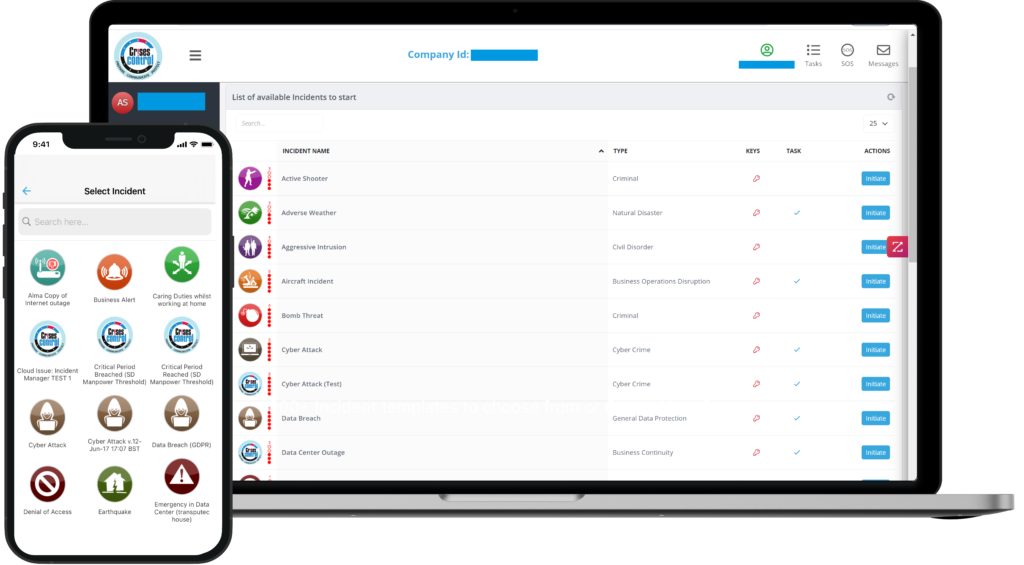Written by Anneri Fourie | Marketing Executive
Imagine your business facing a sudden, unexpected crisis – a fire, a data breach, or a natural disaster. In these critical moments, every second counts, and the difference between chaos and control lies in your preparedness. Many businesses falter because they lack an effective incident management system, leaving employees vulnerable and operations at a standstill.
This blog will guide you through the essentials of choosing the right incident management system, highlighting key features, assessing your business needs, evaluating solutions, and ensuring seamless implementation, all to keep your organisation resilient and ready for any emergency.
Understanding the Importance of an Incident Management System
An incident management system is designed to help organisations quickly respond to and manage emergencies, minimising the impact on business operations. These systems are critical for ensuring workplace safety, maintaining business continuity, and enhancing overall organisational resilience.
Key Benefits
- Improved Response Times: Incident management systems enable swift and efficient responses to emergencies, reducing downtime and mitigating damage.
- Enhanced Communication: These systems facilitate seamless communication among stakeholders, ensuring everyone is informed and coordinated during a crisis.
- Increased Safety: By providing real-time alerts and automated response plans, incident management systems help protect employees and assets.
Key Features to Look For in an Incident Management System
Choosing the right incident management system involves understanding the features that will best support your organisation’s needs.
Real-Time Alerts
Real-time alerts are crucial for timely incident response. Look for a system that provides instant notifications to all relevant parties, ensuring immediate action can be taken.
Automated Response Plans
Automation can significantly enhance efficiency during an emergency. An incident management system with automated response plans allows for predefined actions to be executed without delay, streamlining the crisis management process.
Communication Tools
Effective communication is essential in managing incidents. Ensure the system you choose offers robust communication tools, including mass notification capabilities, secure messaging, and integrated communication channels.
Scalability
Your incident management system should be able to grow with your business. Choose a system that can scale according to your organisation’s size and complexity, accommodating future expansion.
Integration
Integration with existing systems and software is vital for a seamless operation. Look for an incident management system that can easily integrate with your current infrastructure, enhancing its overall functionality.
User-Friendly Interface
Ease of use is a critical factor for quick adoption. A user-friendly interface ensures that all users, regardless of their technical expertise, can effectively utilise the system during an emergency.

Interested in Incident Management?
Customise your Crisis Incident Management Software to meet your specific needs with our flexible tools & stay connected and informed during the crisis and incident management process
Assessing Your Business Needs
Before selecting an incident management system, it’s essential to assess your specific business needs.
Risk Assessment
Conduct a thorough risk assessment to identify potential threats and vulnerabilities. Understanding these risks will help you choose a system that addresses your unique challenges.
Business Size and Complexity
Consider the size and complexity of your business. A larger, more complex organisation may require a more sophisticated incident management system with advanced features.
Industry Requirements
Different industries have specific regulatory requirements and standards. Ensure the incident management system you choose complies with your industry’s regulations, providing peace of mind and legal compliance.
Evaluating Different Solutions
With a clear understanding of your business needs, you can begin evaluating different incident management solutions.
Vendor Reputation
Research the reputation and reliability of potential vendors. Look for vendors with a proven track record and positive customer feedback.
Customer Reviews and Case Studies
Learn from the experiences of other businesses by reading customer reviews and case studies. These insights can provide valuable information about the system’s performance in real-world scenarios.
Trial Periods and Demos
Take advantage of trial periods and demos to test the software. This hands-on experience will help you determine if the system meets your requirements and is easy to use.
Cost Considerations
Budget is always a critical factor in decision-making. However, it’s essential to balance cost with the value provided by the incident management system.
Budget
Establish a clear budget for your incident management system. This will help narrow down your options and prevent overspending.
Cost vs. Value
Evaluate the cost of the system against the value it offers. A higher-priced system may provide more comprehensive features and better support, justifying the investment.
Hidden Costs
Be aware of potential hidden costs, such as implementation, training, and ongoing support. Factor these into your budget to avoid surprises.
Implementation and Training
Once you’ve selected an incident management system, proper implementation and training are crucial for success.
Implementation Plan
Develop a detailed implementation plan that outlines the steps needed to deploy the system. This plan should include timelines, responsibilities, and milestones.
Training Programs
Ensure that all users receive adequate training. Comprehensive training programs will help your team effectively use the system during an emergency.
Ongoing Support
Continuous support from the vendor is vital for long-term success. Choose a vendor that offers reliable support and regular updates to keep your system running smoothly.
Measuring Success
To ensure your incident management system remains effective, it’s essential to measure its performance regularly.
Key Performance Indicators (KPIs)
Identify key performance indicators (KPIs) to assess the system’s effectiveness. Common KPIs include response times, incident resolution rates, and user satisfaction.
Regular Reviews
Conduct regular reviews and updates to ensure the system meets evolving needs. This proactive approach will help you stay prepared for new challenges.
Feedback Mechanisms
Implement feedback mechanisms to gather user input. Use this feedback to make necessary improvements and enhancements to the system.
Return on Investment with Crises Control
Investing in Crises Control not only enhances your crisis management capabilities, but also significantly boosts your ROI by reducing downtime, streamlining communication, and ensuring continuous improvement.
Conclusion
Choosing the right incident management system is a vital decision for any organisation aiming to enhance its crisis management capabilities. In this guide, we have explored the key benefits of incident management systems, essential features to look for, how to assess your business needs, and the process of evaluating different solutions. Additionally, we discussed cost considerations, implementation and training, and the importance of measuring success to ensure continuous improvement.
An effective incident management system not only improves response times and communication during emergencies, but also ensures workplace safety and business continuity. By investing in the right system, you can protect your employees, assets, and operations from unforeseen disruptions.
Get Started with Crises Control
Ready to take your incident management to the next level? Contact us today to get in touch with an expert and learn how Crises Control can help safeguard your organisation. Our team is here to provide you with a personalised demo and answer any questions you may have. Let’s work together to ensure your business is prepared for any crisis.
Request a FREE Demo









